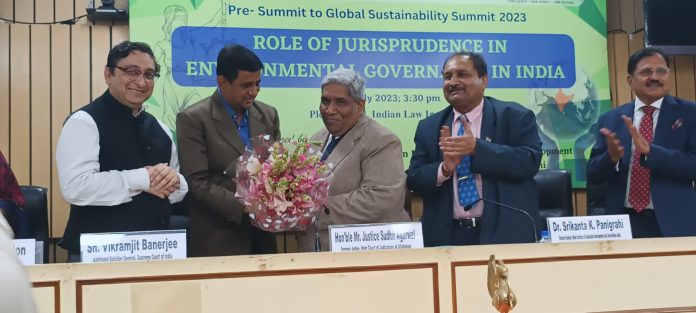By Sangeeta Sharma
Justice Sudhir Aggarwal, member of the National Green Tribunal (NGT), has said that around 56,000 million litre tonnes (MLT) per day of solid waste was being generated and the same amount of untreated sewer was being discharged in various rivers of the country.
Speaking at a seminar Pre-Summit of Global Sustainablity Summit (GSS) 2023 on ‘The Role Of Judiciary In Environmental Governance In India,’ Justice Agarwal said that despite various orders passed by the courts, the authorities were unable to manage and execute the orders.
He said the NGT Act 2010 had no powers to issue a notice of contempt to them.
The NGT member said the role of judiciary in the protection of environment has been substantial.
He said the law of environment in India has been developed by virtue of various judgments passed by the Supreme Court from time to time.
The National Green Tribunal Act 2010 was an incomplete act as no powers of contempt were given to the Tribunal, said Justice Aggarwal, adding that nobody has looked into the matter of environment with a sense of seriousness as they talk in public meetings and seminars.
Lot of discussions and conferences have been held in closed doors but unfortunately, no result could be seen on the ground level, noted the former Judge of the Allahabd Hugh Court.
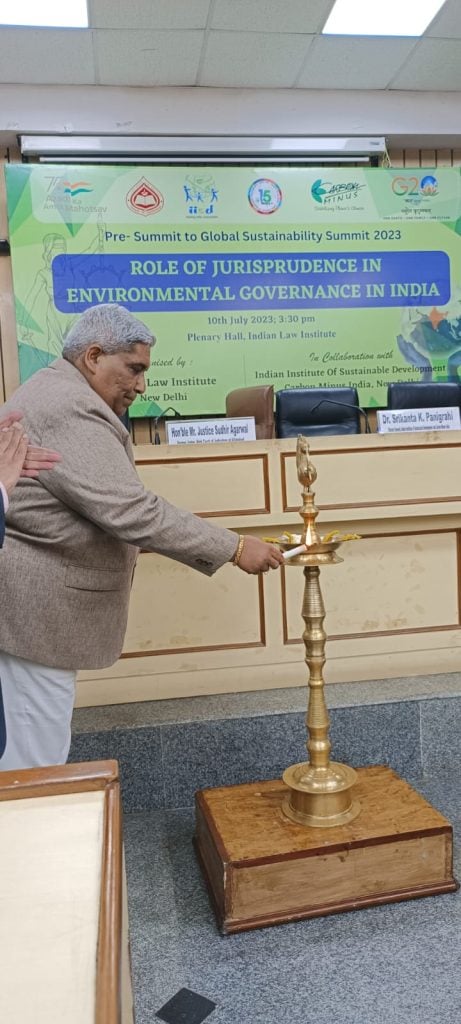
He said there was a huge problem regarding management of solid waste, discharge of sewer and handling of sewer in the country, leave aside the industrial or other types of pollution.
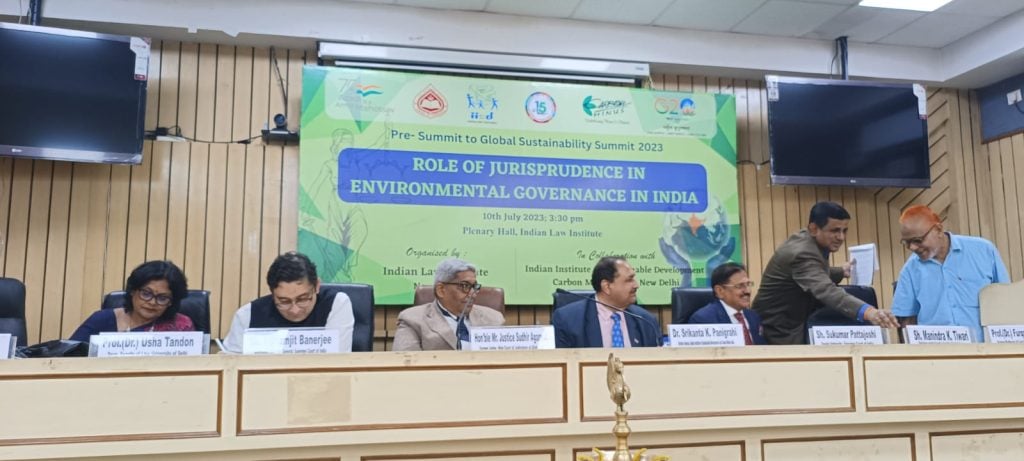
Regarding Ganga pollution, the Supreme Court had initiated a Public Interest Litigation in 1985. This matter continued for 30 years in the Apex Court but when they failed to get any substantive result, the matter was transferred to NGT with the direction to monitor.
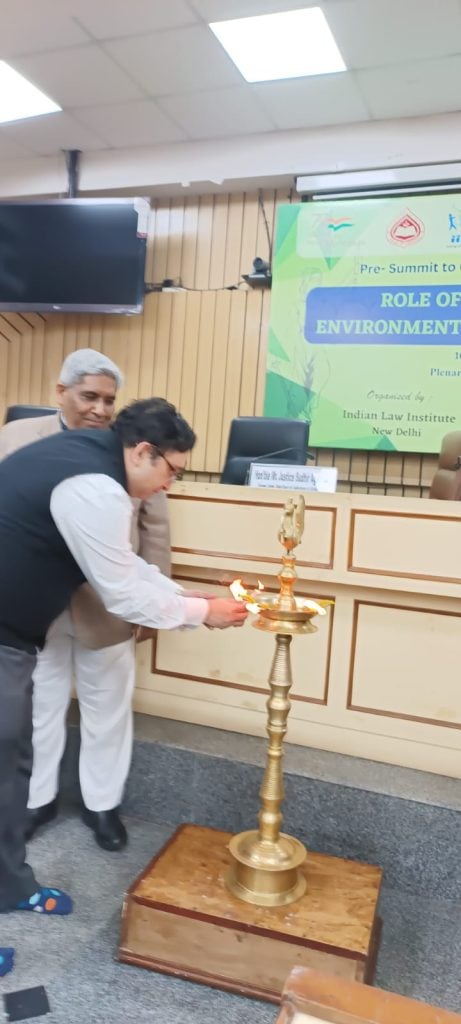
He said NGT Chairman Justice Adarsh Kumar Goel, who retired a few days ago, disposed of the matter in 2007 saying that now the chief secretaries of various states will look into the matter and high powered committees will be constituted. The Supreme Court rejected a petitio related to the matter saying that NGT will monitor it further.
Similarly, with regard to the Solid Waste and Sewerage matter, the Apex court monitored the matter for 20 years and thereafter transferred the matter to us (NGT), Justice Aggarwal said. NGT is, in fact passing orders of handling the solid waste and sewer matters in light of the Supreme Court directions.
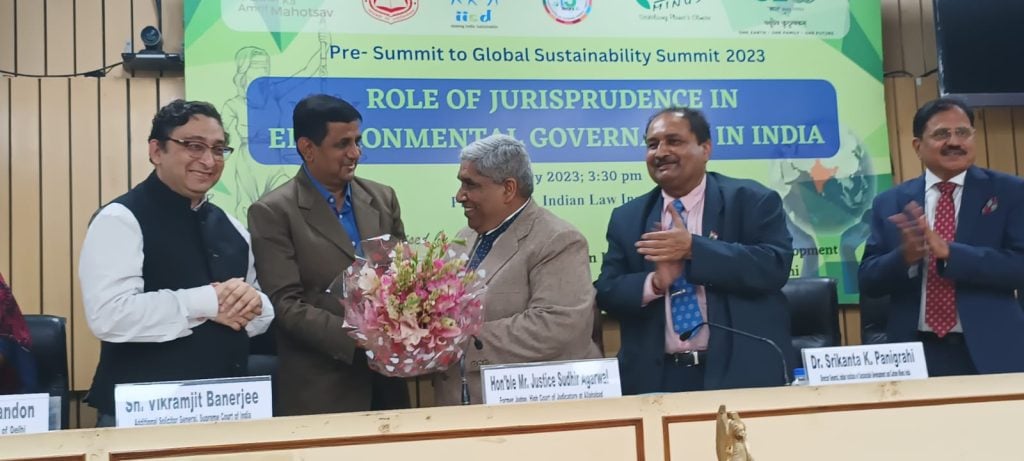
In the last six months, after his joining NGT, Justice Aggarwal said the Tribunal called upon the Chief Secretaries from every state, and from Union Territories and discussed the matter of disposal of solid waste and sewer with them.
More than 79000 crore of environmental compensation were imposed on various states for not complying with NGT orders. Some of the states have paid it. For example, West Bengal has paid Rs 3500 crores. Similarly, some states have paid small amounts. The state of Rajasthan and one more state have procured a stay order from the Supreme Court regarding the payment of compensation. The rest of the states have not bothered to respond even, Justice Aggarwal said.
Justice Agarwal said, “the Problem is of execution since it has to be seen by the executive. Court orders are there but the compliance of these orders is cumbersome. If Orders of the Judiciary are complied with even up to fifty percent, I can assure you, We can see a sea change in the Environment. Not even 10 or 20 percent compliance is there, Justice Aggarwal said.
Everybody says NGT Act is a very noble initiative on the part of the government and a very strong Act, but unfortunately, I am bound to say and with responsibility, I say that it is a half Hearted legislation. Provisions are made for adjudication but there is no effective measure for its execution.
Justice Aggarwal said that there are two provisions of execution–Sections 25 and 26. Section 25 says that the order of the NGT shall be executed like the decree of a civil court. We all know that it is easy to get a civil suit decided in the court but the execution of a decree is the most difficult task. The civil suit can be decided in 10, 20, or 30 years but its execution? no one knows how much time it will take.
There is an alternative also if you (NGT) are heavily loaded with matters, you can send the order for execution to the district court.
The second provision for execution is under Section 26, which is very strongly worded…It says the violation of the tribunal orders is a serious offense and the penalty besides imprisonment is upto Rs 10 crore fine upon the individual for non-compliance of NGT orders and upto Rs 100 crores on the Corporate bodies and if the violation continues then Rs 1 crore per day fine to an individual and Rs 10 crore per day to corporate bodies.
It is very strong legislation and if these powers are given to us we can get every order executed, but unfortunately here also the provisions are we can not do anything. Under section 26 an application of criminal prosecution has to be filed in the court of the magistrate concerned under section 30. The First class magistrate or metropolitan magistrate will take up the matter, will try the matter as a criminal case and thereafter he will pass the orders. Can u imagine any magistrate imposing a fine of crores of Rupees? I am sure till now nobody has ever done this throughout the country, Justice Aggarwal said.
So both provisions are virtually impracticable and difficult to get the orders executed. Other bodies have got the power of issuing contempt notices if their orders are not complied with, but similar powers are not given in the NGT Act 2010, Why? we don’t know, Justice Aggarwal said. In fact, I am told that NGT is treated as a villain because we stop their developmental activities.
The NGT Act was enacted in 2010, for judicial governance of matters related to the environment. NGT has decided thousands of cases till now which are of various natures covering almost everything from illegal mining to factory pollution to sound pollution.


